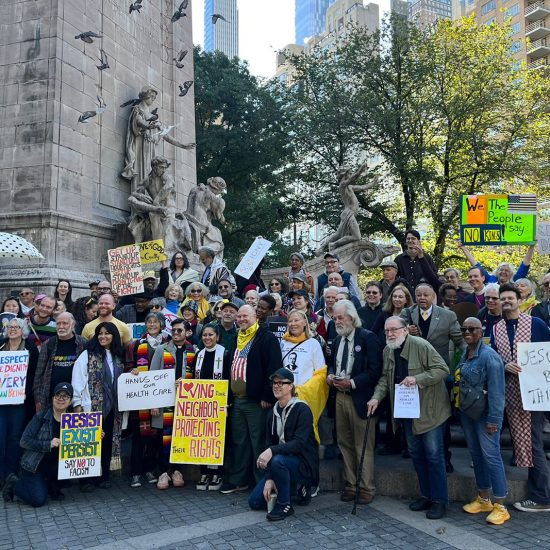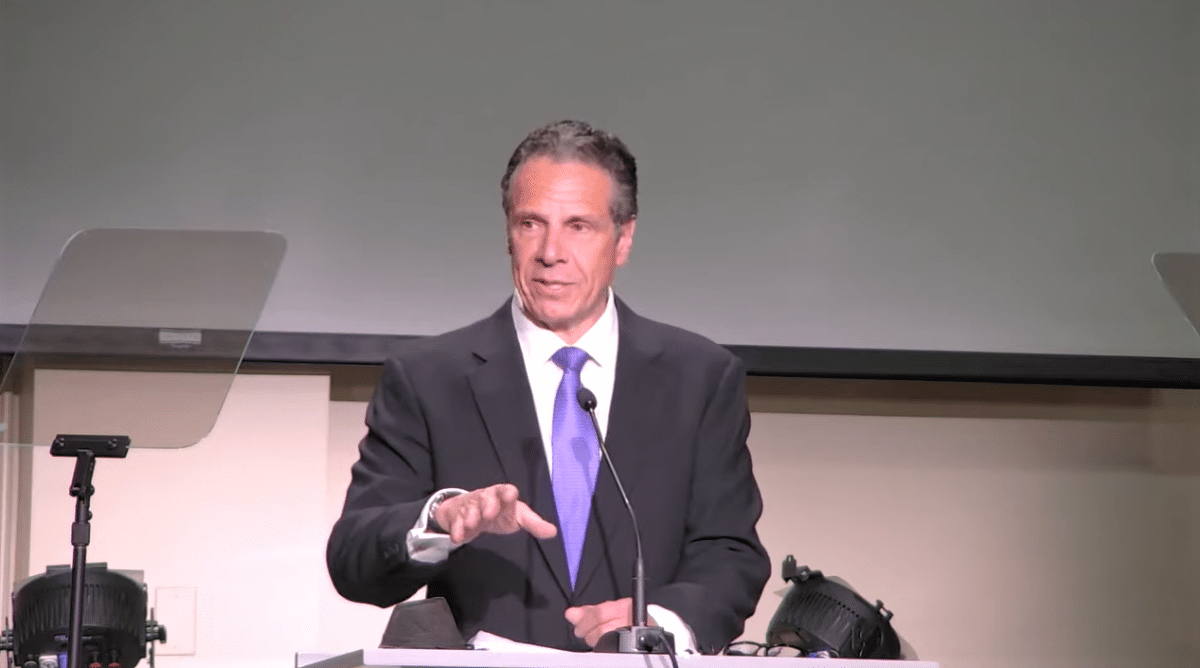
Andrew Cuomo is running for office again.
That’s the obvious conclusion after the disgraced former New York governor spoke during worship at God’s Battalion of Prayer Church in Brooklyn on Sunday (March 6). Invited into the pulpit by Rev. Alfred Cockfield II, a longtime Cuomo supporter, the formerly powerful political scion told the few dozen congregation members, “God isn’t finished with me yet.”
With millions of dollars in the bank and a chip on his shoulder, Cuomo has been plotting a political comeback for some time. And he’s doing this even though last August he resigned his office under threat of impeachment after an investigation by the state’s attorney general, a fellow Democrat, concluded he sexually harassed at least 11 women.
Cuomo apologized in his resignation address to the women who he “truly offended.” Yet, he remained defiant about the accusations. Speaking directly to his daughters in that same speech, he said, “I want [my daughters] to know from the bottom of my heart that I never did and I never would intentionally disrespect a woman or treat any woman differently than I would want them treated. And that is the God’s honest truth.”
Publicly, Cuomo is trying to have it both ways. He wants forgiveness for any perceived transgressions while steadfastly denying he did anything wrong.
There’s at least one regular churchgoer in NYC who’s not having it. New York Attorney General Letitia James (who remains the target of Cuomo’s ire) called the former governor she helped bring down a “sick, pathetic man.”
“Serial sexual harasser Andrew Cuomo won’t even spare a house of worship from his lies,” she added after he spoke Sunday. “Even though multiple independent investigations found his victims to be credible, Cuomo continues to blame everyone but himself.”
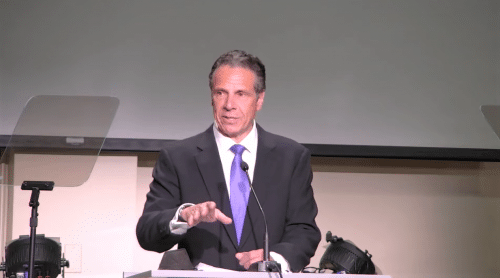
Screengrab as Andrew Cuomo speaks during Sunday worship at God’s Battalion of Prayer Church in Brooklyn, New York, on March 6, 2022.
Americans are accustomed to scandal-plagued politicians seeking to publicly rehabilitate their images. There’s a ritual we expect them to follow: acknowledge their errors, apologize for the harm they caused, accept public censure, and show repentance through changed behavior. But Cuomo appears to be rejecting that process, going through the motions of confession in a quest to jump straight to political redemption.
In seeking this easy exoneration, the former governor of New York is far from alone. In this edition of A Public Witness, we revisit one of the most famous quests for political absolution in recent history. We then go to church with Cuomo to consider his plea for mercy. Finally, we meditate on the larger, troubling pattern of our unapologetic political culture.
Clinton’s Contrition
On Sept. 11, 1998, an embattled President Bill Clinton spoke to a breakfast gathering of clergy to give what would become one of the more important speeches of his career. Earlier that year, he had lied in a sworn deposition that he hadn’t had a “sexual relationship” or “sexual relations” with former White House intern Monica Lewinsky. He also publicly denied the allegations.
In August, he changed his tune in a taped grand jury testimony. He also gave a statement on TV that evening admitting to an inappropriate relationship with Lewinsky. But his efforts to spin his behavior and his previous statements sparked criticism. The release of the graphic Starr Report on Sept. 9 further added to the scandal.
So, Clinton tried a different approach while standing before religious leaders. Rather than defiant and aggressive, he took a more contrite tone. And instead of offering excuses, he admitted to moral wrongdoing.
“I agree with those who have said that, in my first statement after I testified, I was not contrite enough. I don’t think there is a fancy way to say that I have sinned,” Clinton told the ministers. “I believe that to be forgiven, more than sorrow is required. At least two more things: First, genuine repentance, a determination to change and to repair breaches of my own making. I have repented. Second, what my Bible calls a broken spirit. An understanding that I must have God’s help to be the person that I want to be.”
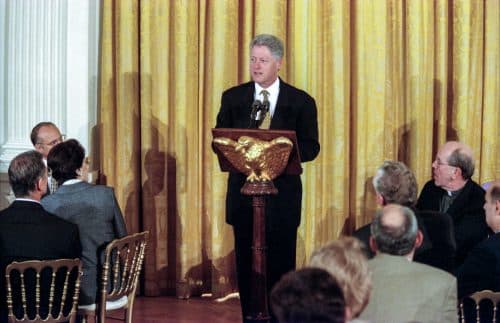
President Bill Clinton speaks to a group of ministers during a prayer breakfast on Sept. 11, 1998, in the White House in Washington, D.C. (Richard Ellis)
“If my repentance is genuine and sustained, and if I can then maintain both a broken spirit and a strong heart, then good can come of this for our country, as well as for me and my family,” Clinton added. “I ask you to share my prayer that God will search me and know my heart, try me and know my anxious thoughts, see if there is any hurtfulness in me and lead me toward a life everlasting. I ask that God give me a clean heart, let me walk by faith and not sight.”
It wasn’t just Clinton’s words that hit the notes many expected. He also delivered a convincing performance. As the Washington Post described it the next day, “With tearing eyes and a trembling voice, President Clinton succeeded yesterday in convincing a room full of religious leaders that he was genuinely sorry about his affair. … One after another, ministers, rabbis, and imams left the White House prayer breakfast saying they were moved by the sight of the most powerful man in the world humbling himself so thoroughly before them.”
Even some conservative ministers who didn’t previously support Clinton told reporters they saw Clinton’s confession as sincere and powerful. As historian Susan Wise Bauer noted in her book The Art of the Public Grovel, “Clinton’s virtuoso performance” helped him remain in office as he “skillfully combined the language of confession with the rhetoric of holy war and the goals of secular political gain.”
We don’t know Clinton’s heart, but we do know public polling. His prayer breakfast remarks helped him weather the scandal. It also helped create a model for other politicians who find themselves in a similar predicament (which, sadly, does seem to happen a lot). But some now want to skip past repentance and right to redemption, past contrition and right to campaigning.
Help sustain the ministry of Word&Way by subscribing to A Public Witness!
Confessions of an Unrepentant Politician
With cultural expectations that a politician needs to go through the public ritual of confession, Cuomo’s first public remarks since leaving office seven months ago occurred in a church. But the White Catholic chose a Black Protestant church as the site, thus choosing a friendly space that lacks the accountability of relationships occurring within one’s own faith community. And as we watched the service, this made sense because while Cuomo attempted to cosplay confession, he actually remained unrepentant.
Rev. Alfred Cockfield II introduced the “special guest” by praising Cuomo’s gubernatorial decisions during the pandemic as proof that “God doesn’t make mistakes” — a suggestion that God wanted Cuomo as governor during that time. Cockfield, who created a PAC that boosted the candidacy of New York Mayor Eric Adams, had been appointed to the Long Island Power Authority by Cuomo last year. Cockfield praised Cuomo for providing masks for the church to distribute and making the church a vaccination site, adding, “you can bless the Lord for that.”
After the introduction, Cuomo walked onto stage where teleprompters had been set up for him (they don’t appear in videos of previous Sundays). The church’s pianist gently played as he made his way to the pulpit and even during the first few moments of his remarks, almost musically baptizing this speech as a sermon.
“Well, good morning. God is good,” Cuomo said in call-and-response form as he started his remarks. “We’ve been socially distanced but we are always socially connected, and we are spiritually and socially connected here today. And I want to thank you for having me here today as we celebrate the first Sunday of Lent.”
Cuomo quickly got to the topic of his fall from political grace. Speaking in “this holy hall,” he cast himself as the real victim for his Lenten address.
“As you probably know, I’ve gone through a difficult period the past few months. I resigned as governor, the press roasted me, my colleagues were ridiculed, my brother was fired. It was ugly,” he said. “It was probably the toughest time of my life.”
Cuomo insisted the real problem was that “some people, especially younger people” have “a new sensitivity” about how to treat women. Claiming that “no one ever told me I made them feel uncomfortable” and that he “never sensed that I caused anyone discomfort,” he acknowledged that “social norms evolve.” Thus, he said he was “truly, truly sorry” that he “didn’t appreciate how fast their perspective changed.” But the man who resigned from office insisted that he didn’t break any law or regulation — and he spent quite a bit of time detailing the various ways he felt investigations had exonerated him.
Thus, Cuomo cast himself as victim of a “cancel culture mentality” from “Democratic extremists” and “political sharks in Albany” who “exploited the situation for their political purpose.” Those who drove him out, he argued, were guilty of “abuse of power,” “government corruption,” and “prosecutorial misconduct.” And he attacked reporters and social media for adding to the accusations. He claimed people were out to get him because he was elected to fight the bureaucrats and “say ‘hell no’ to the status quo.”
“They used cancel culture to effectively overturn an election,” he added with Trumpian flair. “This cancel culture represents a new extremism.”
“If you want to cancel something, cancel federal gridlock, cancel the incompetence, cancel the infighting, cancel crime, cancel homelessness, cancel education inequality, cancel poverty, cancel racism. Be outraged, but be outraged at what really matters,” Cuomo said after attacking the Democratic Party for giving into the “cancel culture mob.”
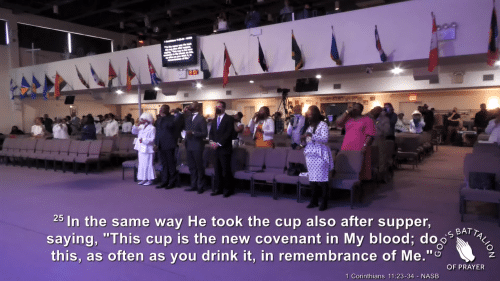
Screengrab as Andrew Cuomo stands stoically while others take communion in God’s Battalion of Prayer Church in Brooklyn, New York, on March 6, 2022.
While the 25-minute speech mostly included complaints and criticism of his political opponents, he sprinkled in biblical allusions and statements about God. He referenced Psalm 46 about God as refuge, Matthew 25 about helping the least of these, Romans 5 about suffering producing perseverance, and an unspecified place in Genesis about good coming from suffering. And he claimed to find “inspiration” from the words of the late John Lewis about continuing to struggle and getting in “good trouble.”
“I haven’t spoken about it in public yet because I wanted to talk about it here with you because God’s guidance is helping me through,” Cuomo said. “Let go, let God. I believe in life God sends us challenges. Life will knock us down at some point. And then the question is what do we do in that moment.”
Cuomo said that moving forward involved a struggle that he likened to “a bridge that one needs to cross.” And he added just seven months after leaving office that “it’s a long bridge” to move “from anger to acceptance, from resentment to reconciliation. I am now working to cross that bridge, and I believe that God has a reason for our path. I pray on it, and the good book has offered me guidance.”
The key to crossing that bridge, he added, “starts with telling the truth” since “in life you will never solve a problem that you are unwilling to admit.” So, he then told “my truth.” And what is “truth” from his perspective? That he was completely exonerated.
“The truth has actually come forth and I feel vindicated,” he said.
For Cuomo, telling the truth doesn’t mean confessing his shortcomings but attacking his political opponents. And then he’s quickly ready to move forward, believing he’s checked the box on public contrition and redemption.
“God isn’t finished with me yet,” he said to applause. “I am blessed, my friends. I have many options in life and I’m open to all of them.”
“Right now we have to rise up, brothers and sisters. Right now we have to fight the good fight because the struggle continues. We have to stand up for progressive politics,” he added. “Let’s make some good trouble, and let’s make this state the greatest state in the nation. Thank you and God bless you.”
After his remarks, the church service continued with more worship songs and another sermon by a minister. Then they closed with communion as Cuomo stood still while the rest of the congregants participated.
Get cutting-edge reporting and analysis like this in your inbox every week by subscribing today!
Cheap Political Grace
Cuomo is not the only disgraced former governor currently seeking to rehabilitate his reputation. There’s an eerie parallel between his case and the events that unfolded in Missouri to usher Republican Eric Greitens out of office.
Elected in the Trump wave of 2016, Greitens ran as an outsider pledging to clean up corruption in state government. He quickly came under a cloud of suspicion related to campaign finance violations, misuse of a donor list from a nonprofit he ran, and — more explosively — allegations of an affair with a hairdresser that involved coercive sexual activity. After 18 months on the job, he also resigned to avoid impeachment from a legislature controlled by his own party. In stepping down, Greitens showed even less contrition than Cuomo.
“I know, and people of good faith know, that I am not perfect, but I have not broken any laws nor committed any offense worthy of this treatment,” he protested as he announced his departure. “For those who would be moved to vengeance, let us allow history and God to bring justice.”
Greitens quickly moved to rewrite history according to his terms. Referring to a settlement reached with the Missouri Ethics Commission that resulted in a large fine, he proclaimed himself “completely exonerated.” (Such rhetoric may sound familiar.) Having officially put the campaign finance violations in the rearview mirror, he conveniently ignored the other scandals that engulfed him while in office.
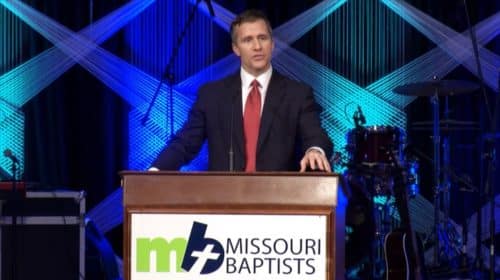
Screengrab as Gov. Eric Greitens speaks to the 2017 annual meeting of the Missouri Baptist Convention at Connection Point Church in Raytown, Missouri, just months before resigning from office.
Now Greitens is the leading candidate for the GOP nomination in Missouri’s open Senate race. Donald Trump may be close to endorsing him. And those ethical issues from the past? He told the conservative radio show host Hugh Hewitt that it’s all “100% false,” “leftist lies,” the work of a “George Soros-funded prosecutor,” and a variety of other deflections. There’s no shame, no acknowledgment of wrongdoing, and no acceptance of responsibility for the harm caused to others.
When pressed by Hewitt on why he resigned as governor if he was so innocent, Greitens made his goals clear: “You recognize you can lose a battle, but you can win the war.” Cuomo similarly seems focused on staging a comeback after losing the last round.
Neither of us know Cuomo or Greitens personally, but it’s hard not to be cynical about their explanations and motives. Both seem hungry for power. When their personal failings compromised their ability to remain in office, they proved incapable of owning their mistakes and accepting the consequences of their decisions. Now they are desperate for a return to the limelight and want the political equivalent of “cheap grace” from voters.
That’s the term coined by the theologian Dietrich Bonhoeffer in The Cost of Discipleship. He wrote: “Cheap grace is the grace we bestow on ourselves. Cheap grace is the preaching of forgiveness without requiring repentance, baptism without church discipline, Communion without confession, absolution without personal confession.”
Obviously, public officials should not be judged by the standards of Christian theology. But there’s a secular version of this idea on display in the sagas of Cuomo, Greitens, and others. Despite their lack of a confession, they want their past behavior to be ignored for present political purposes. We’re idealistic enough to believe there should be consequences for violating the public’s trust.
And while there can be some space for second acts in politics, we should expect politicians to begin with a note of contrition for the damage inflicted on our democratic society and a sense that they actually learned from past failings. Unrepentant candidates do not deserve the trust of voters. Churches and religious communities should not participate in the charade of cheap political grace.
As a public witness,
Brian Kaylor & Beau Underwood

